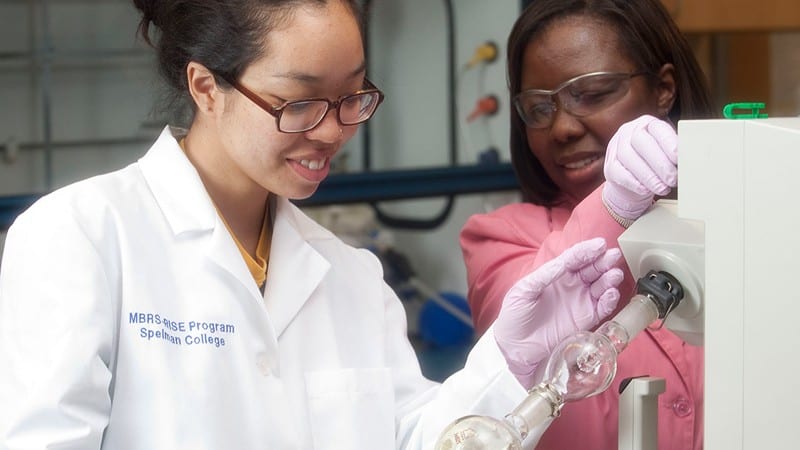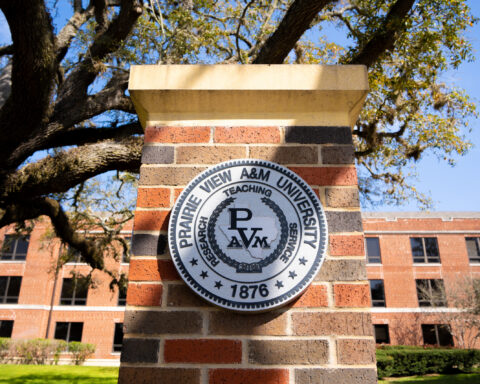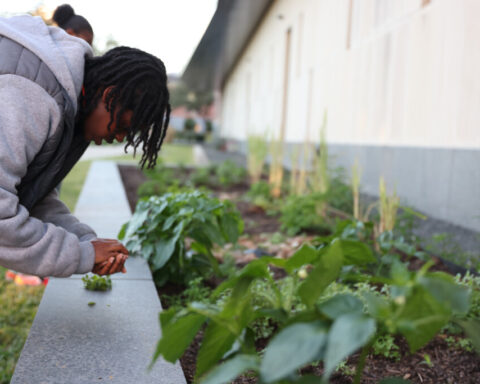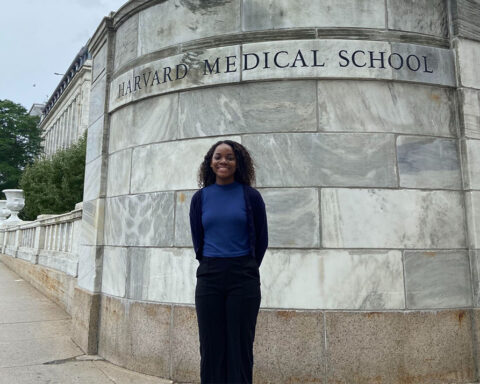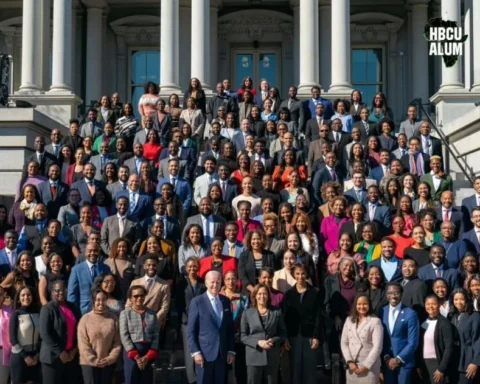Courtesy of Prairie View A&M University
Princeton University is partnering with UNCF (United Negro College Fund) and five historically Black colleges and universities (HBCUs) to launch a groundbreaking program designed to enable research collaborations between Princeton faculty and their peers at HBCUs.
During the initial phase, Princeton researchers and researchers from Howard University, Jackson State University (JSU), Prairie View A&M University (PVAMU), Spelman College and the University of Maryland Eastern Shore (UMES) will co-lead research projects. These projects will be funded by Princeton University through its new Princeton Alliance for Collaborative Research and Innovation (PACRI).
Teams of Princeton-HBCU researchers are invited to submit proposals by June 30. The initiative’s aim is to fund multiple collaborative projects each year between Princeton and each partnering institution.
“Collaboration is a powerful force for new ideas and creativity in research and scholarship,” said Princeton’s Dean for Research Pablo Debenedetti, the class of 1950 professor in engineering and applied science and professor of chemical and biological engineering. “By creating a mechanism that encourages faculty from Princeton and HBCUs to work together, we hope to spark the creation of new teams of researchers that bring together people with different perspectives, experiences and expertise. The potential to generate new knowledge and discoveries across a wide range of disciplines is very exciting,” Debenedetti said.
Echoing Debenedetti’s enthusiasm, Vice Dean for Innovation Rodney Priestley, the Pomeroy and Betty Perry Smith professor of chemical and biological engineering and a co-leader of the PACRI program, said, “We highly value partnerships at Princeton, whether they are with other academic institutions, industry, governments or nonprofits. We believe that these collaborations enable Princeton researchers and innovators to achieve things that we cannot achieve alone.”
Priestley explained that the new PACRI program is similar to other Princeton funding programs that foster collaborations unlikely to happen without the support. According to Priestley, these “innovation fund” programs are popular with Princeton faculty because they enable new partnerships and scholarship. “In some cases, researchers have been able to establish foundational work that could then attract greater funding. I am looking forward to seeing what will come out of these teams.”
Tod Hamilton, associate professor of sociology and acting director of the Office of Population Research, is co-leading PACRI with Priestley. He notes that research collaborations, particularly those that cross disciplinary and institutional boundaries, are critical to generating cutting-edge insights needed to advance the frontier of knowledge within the academy and broader society. “We all benefit from initiatives that facilitate the exchange of ideas and remove barriers to innovation,” Hamilton said.
U.S. Rep. Bonnie Watson Coleman (D-NJ) is enthusiastic about this program that will build research ties between Princeton, located in her district, and HBCUs across the country. “I’m very excited about the potential of collaborative projects between Princeton University researchers and their HBCU partners,” said Watson Coleman. “Princeton University has long led the way in innovative research in STEM, social sciences and the humanities. Collaboration with Howard University, Jackson State University, Prairie View A&M, Spelman College and the University of Maryland Eastern Shore will no doubt produce extraordinary benefits to all collaborating institutions and the nation as a whole. Much of the output would likely never happen without these collaborative efforts. I applaud all the institutions involved and look forward to seeing all of what they achieve.”
U.S. Rep. Eddie Bernice Johnson (D-TX) also underlined the potential benefits to the nation. “As Chairwoman of the Committee on Science, Space, and Technology, I am excited about the work we are doing to chart a course for the future of innovation in this country. However, we cannot expect to address the enormous challenges we face if we don’t leverage all the STEM talent in this country,” Johnson said. “The nation’s HBCUs have long played an outsized role in preparing talented Black students for rewarding careers in science and technology fields. We must empower HBCUs to reach their full potential, both in their education mission and in advancing urgently needed research and technological innovations. The faculty partnerships supported through PACRI will pay dividends in expanding, enriching and accelerating our scientific enterprise.”
Princeton worked with UNCF to help get the program off the ground, enlisting their assistance to identify partners in this inaugural year.
“UNCF is excited to support this groundbreaking initiative connecting Princeton University faculty and research faculty at HBCUs,” said Chad Womack, Ph.D., senior director of National STEM Programs and Initiatives, UNCF. “PACRI will provide much-needed funding to help establish sustainable research collaborations between Princeton and HBCU faculty across a variety of HBCU campuses. We’re proud to partner with the PACRI team at Princeton to support engagement with leadership and faculty and to assist in the selection of HBCU campuses and then proposals via the RFP process,” Womack continued. “We expect phenomenal proposals from HBCU research faculty and their Princeton partners and look forward to helping to build research capacity at each of the esteemed HBCUs participating in PACRI.”
Each HBCU sees possibilities in the program that fit its faculty and institutional interests.
“I see great potential in bringing together great minds from two excellent institutions to tackle common problems of interest for mutual benefit,” said Bruce Jones, Ph.D., professor and vice president for research, Howard University’s Office of Research. “We will create synergy and grow as we learn from each other in the spirit of collaboration.”
“At Prairie View A&M University, collaborative partnerships continue to be a cornerstone to our research and innovation enterprises. Across all three PVAMU campuses, you will find faculty and research scientists engaged in significant projects with federal agencies, corporate industries, local governmental bodies, and other universities, which furthers our impact on society on many levels,” said Magesh Rajan, Ph.D., P.E., MBA, vice president, PVAMU Division of Research and Innovation. “Joining the Princeton alliance is an outstanding opportunity for our experts to team up with additional creative minds to pursue studies and projects that could be revolutionary and life-changing.”
Throughout his career as a scientist and as Princeton’s first vice dean for innovation, Rodney Priestley has been focused on accelerating the transformation of research into beneficial innovation. He gets fired up thinking about what PACRI could set in motion. “I hope the alliance will lead to faculty from Princeton and partners working together to create new intellectual property and spinouts. These could be powerful pathways for PACRI-fueled collaborations to have a positive impact on society,” Priestley said.
Jackson State Vice President for Research and Economic Development Joseph A. Whittaker, Ph.D., shares Priestley’s enthusiasm for the role PACRI may play in helping translate research out of the lab. “Participation in the alliance will likely afford JSU and other HBCUs opportunities to further diversify and expand their respective research capacities in STEM and non-STEM disciplines,” said Whittaker. “I envision that the PACRI collaborations will be uniquely situated not only to solve challenging research problems but also to drive novel and emergent methodologies, as well as technologies and intellectual property that will serve as foundations on which to build and advance start-ups and inclusive economic development.”
Princeton’s Hamilton pointed out that the new program is not limited to STEM; PACRI aims to provide funding across all academic divisions. “A commitment to the liberal arts is at the core of Princeton University’s mission. Advancing scholarship in the humanities and social sciences is a critical goal of the new alliance,” Hamilton said.
This broad program scope is well-suited to the research interests of faculty at several of the partner institutions, including Spelman and the University of Maryland Eastern Shore.
“We are excited about Spelman College’s selection as one of the five HBCUs for the Princeton Alliance for Collaborative Research and Innovation, which will expand more opportunities to forge meaningful and sustainable research partnerships in Humanities, Social Science and Education,” said Mary Schmidt Campbell, Ph.D., president, Spelman College. “Our stellar faculty, who play a big role in Spelman’s national rankings, are committed to their respective research agendas and engaging undergraduate students in scholarly projects. Our Office of Research, Innovation and Collaboration looks forward to facilitating collaborative research efforts that align with Princeton’s Department of African American Studies, Center for Digital Humanities, Center for Health and Wellbeing, and the Princeton Institute for Regional and International Studies.”
According to Heidi M. Anderson, Ph.D., president, University of Maryland Eastern Shore, “The majority of our graduates are in STEM fields, and as a Carnegie Designated High Research University, we do significant research; however, our students also benefit from the critical thinking skills gained in the humanities. Working with their peers at Princeton will be a great benefit to all faculty.”
“We look forward to the light that will shine on our campus as a result of participating in PACRI and showcasing the exciting work our faculty and students are doing,” she said.
PACRI is one of several initiatives by Princeton’s Office of the Dean for Research aimed at expanding a more inclusive research, innovation and entrepreneurship ecosystem at Princeton and beyond. While this first phase of the Alliance focuses on HBCUs, Princeton anticipates expanding the effort to forge research collaborations with other minority-serving institutions (MSIs) and women’s colleges.
###
About UNCF
UNCF (United Negro College Fund) is the nation’s largest and most effective minority education organization. To serve youth, the community and the nation, UNCF supports students’ education and development through scholarships and other programs, supports and strengthens its 37 member colleges and universities, and advocates for the importance of minority education and college readiness. UNCF institutions and other historically Black colleges and universities are highly effective, awarding nearly 20% of African American baccalaureate degrees. UNCF administers more than 400 programs, including scholarship, internship and fellowship, mentoring, summer enrichment, and curriculum and faculty development programs. Today, UNCF supports more than 60,000 students at over 1,100 colleges and universities across the country. Its logo features the UNCF torch of leadership in education and its widely recognized trademark, ‟A mind is a terrible thing to waste.”® Learn more at UNCF.org or for continuous updates and news, follow UNCF on Twitter at @UNCF.

